Agriculture & Environment
Mak staff trained on the importance of Diversity & Inclusion
Published
4 years agoon
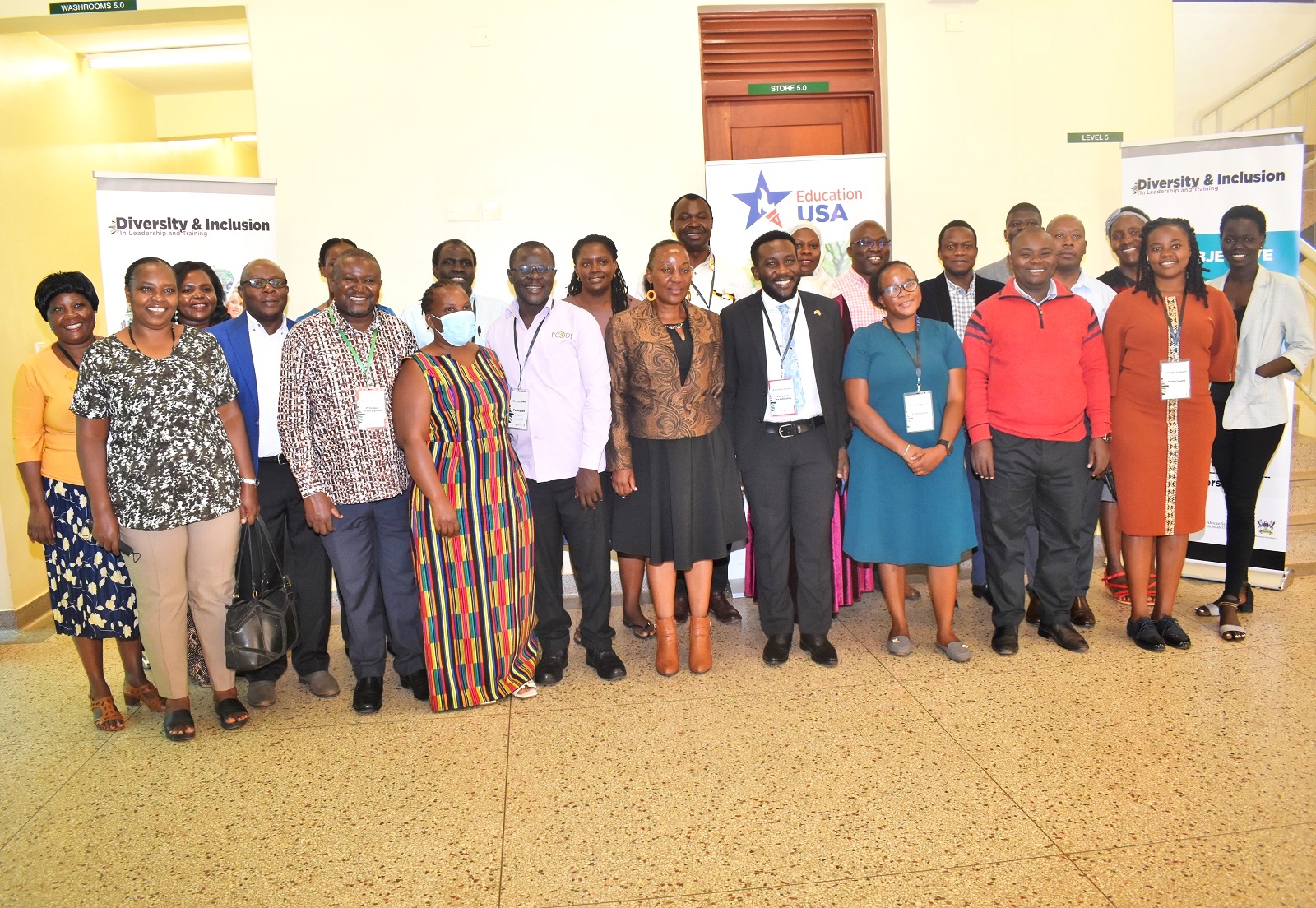
Diversity and Inclusion (D&I) in Leadership and Training: The project funded by Michigan State University’s Alliance for African Partnership (AAP), under the Transforming Institutions Strategic Funding seeks to deepen knowledge and sensitivities on diversity and inclusion at the participating institutions.
The Second D&I Workshop Held at Makerere University
The Department of Extension and Innovation Studies, College of Agricultural and Environmental Sciences (CAES), Makerere University on 28th July 2022 held the second workshop on diversity and inclusion for management and staff from participating institutions. The activity held at the Yusuf Lule Central Teaching Facility at Makerere University was graced by the Principal of CAES, Prof. Gorettie Nabanoga. It featured expert presentations on integrating diversity and inclusion in teaching, training and community engagement; exploration of inclusive teaching and research; as well as cultivation and nurturing diverse and inclusive environments.
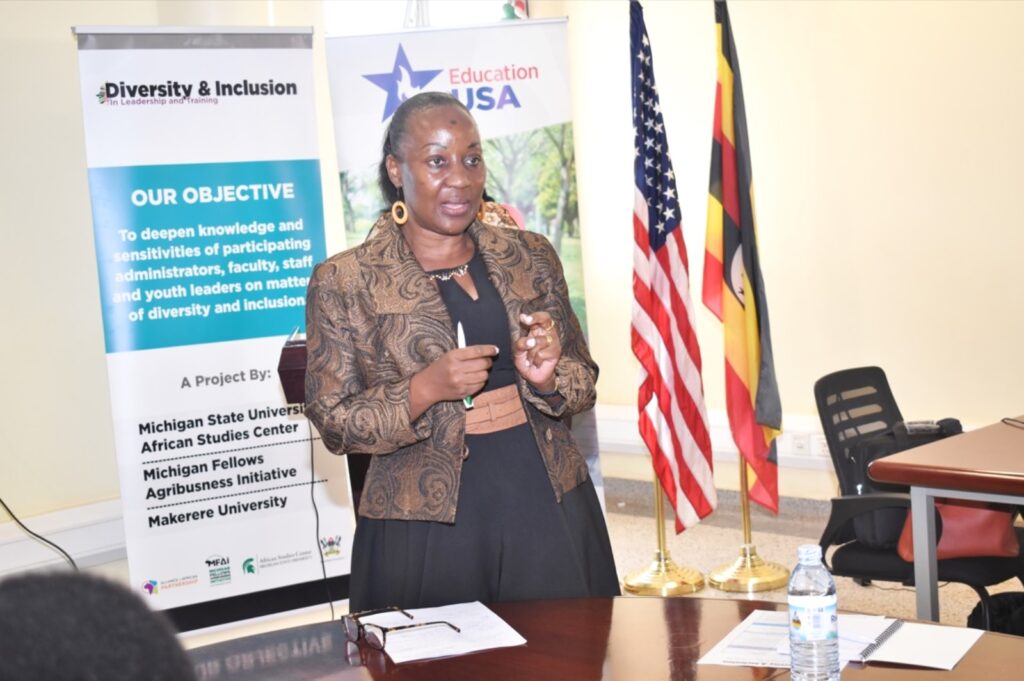
About the D&I Project
The Diversity and Inclusion in Leadership and Training project, funded by Michigan State University’s Alliance for African Partnership (AAP), under the Transforming Institutions Strategic Funding is implemented by Michigan Fellows Agribusiness Initiative (MFAI), Makerere University (Mak), and Michigan State University (MSU)-African Studies Centre. The project features a series of trainings aimed at deepening the knowledge and sensitivities of participating administrators, faculty, staff and youth leaders on matters of diversity and inclusion. The overarching objective of the project is to increase the representation of categories of people typically marginalized from leadership and decision-making processes such as women, people living with disabilities and youth from low income earning families. The project Principal Investigator (PI) at Makerere University is Prof. Nelson Turyahabwe, Head, Department of Extension and Innovation Studies at CAES.
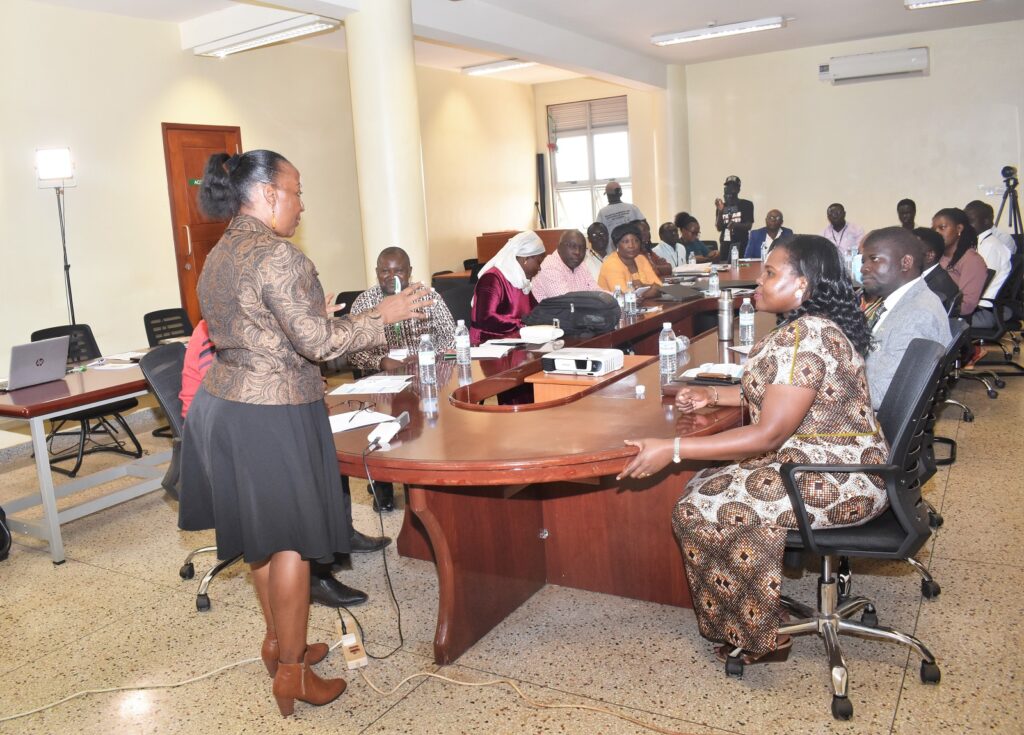
Presentations at the workshop
Addressing participants at the workshop, the Principal of CAES, Prof. Gorettie Nabanoga, emphasized the importance of inclusivity in all University programmes. “Inclusivity is extremely important and starts with us as individuals. It is important for fulfilling the University mission and core values and each one of us, regardless of our shortcomings has a contribution to make. We must therefore be intentional on diversity and inclusion and must always practice fairness and justice in our pursuit for inclusivity,” she explained.
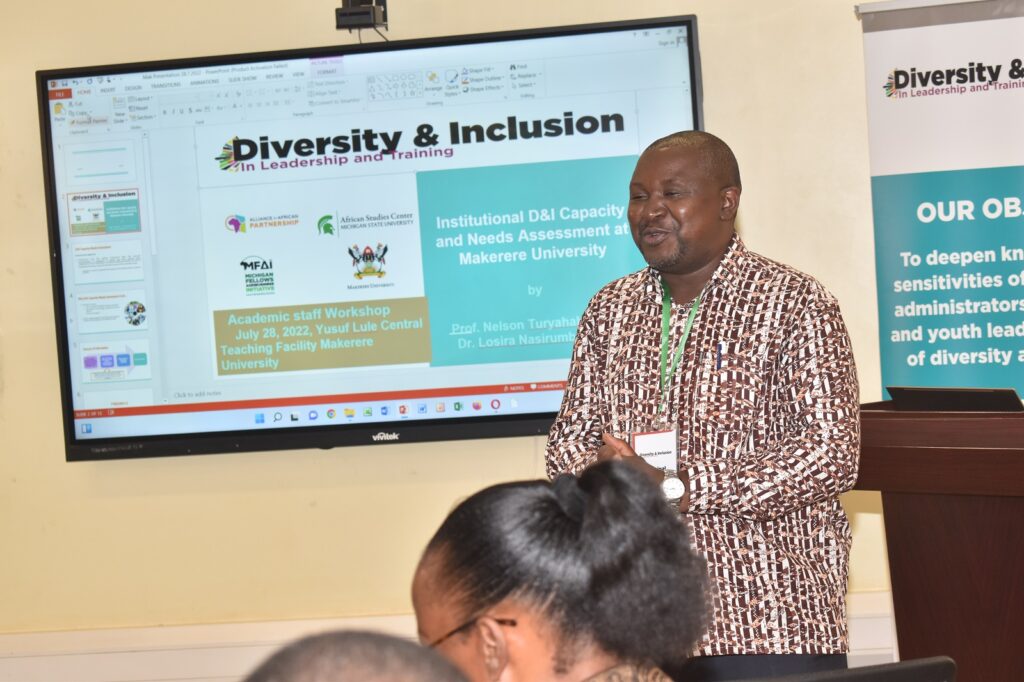
The Institutional Diversity and Inclusion (D&I) Capacity and Needs Assessment at Makerere
Sharing the project findings on Makerere University, the PI, Prof. Nelson Turyahabwe indicated that some of the University policies do not outrightly address issues of diversity and inclusion. He called for periodical reviews to ensure diversity and inclusion are emphasized in all University programmes. According to the Institutional D&I Capacity and Needs Assessment conducted at Makerere, the University is an inclusive institution with policies and procedures that provide equal opportunity for all and generally lay foundation for diversity, equity and inclusion in the provision of services to the wider community without discrimination. However, integration of diversity, equity and inclusion in the University core mandate areas: teaching, research, and Knowledge Transfer and Partnerships is wanting, thus the need for training of persons responsible for these core functions. The Institutional D&I Capacity and Needs Assessment targeted to understand how the partner institutions take into account representation of categories of people that have typically been marginalized from leadership and decision-making processes as well as integration of Diversity, Equity and Inclusion in the mandate areas. The assessment was conducted by staff from the Department of Extension and Innovation Studies led by Prof. Turyahabwe (PI) and Dr. Losira Nasirumbi Sanya.
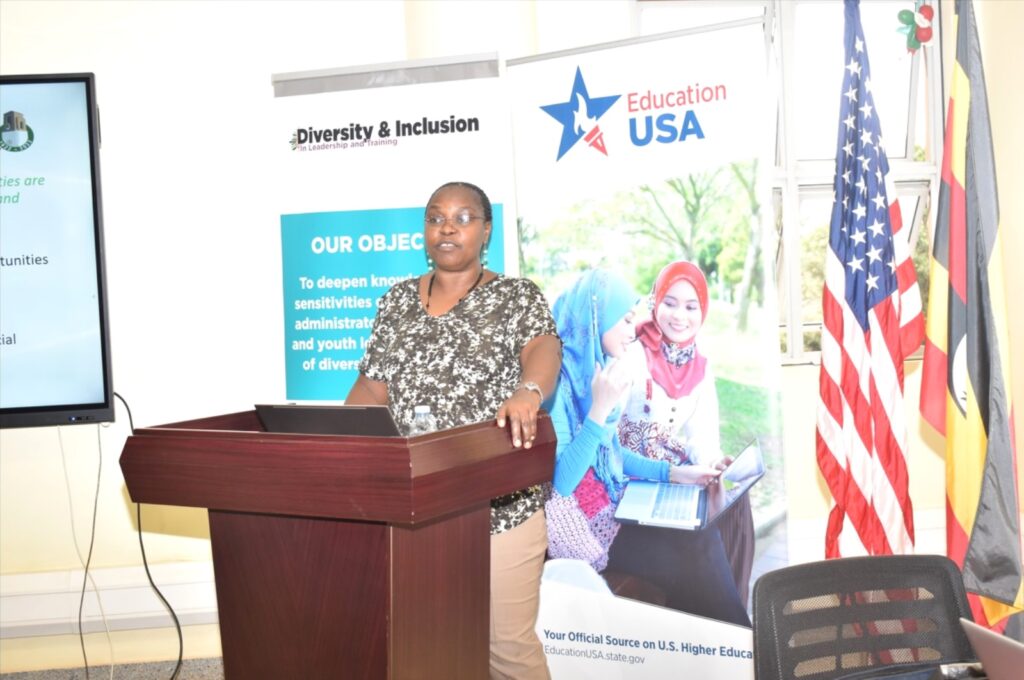
Preliminary findings/ Status of D&I at Makerere University
- Appointment and Recruitment of Staff policies are silent on D&I. ‘Equal Opportunity Employer’ is more of theory than practice
- Admission of students: All courses are open to all gender; Girls are given affirmative action of 1.5 at entry and 40% for females in STEM. There is a District quota system to address imbalances and cater for the less privileged/disadvantaged students from rural districts and also minority tribes. However,there is still low consideration of D&I in the admission of graduate students
- Curriculum Development: Many programmes are approved without gender and equity considerations. Appreciation of the importance of D&I is not shared across the board
- Teaching and Learning: Instructors/Lecturers to some extent use gender-responsive pedagogy. There are limited facilitates and support systems for special groups – Venues/buildings without lifts and ramp, no exams and examination scripts to cater for PWDs and no childcare facilities. Limited capacity – inadequate or no training on D&I
- Staff Development: The Staff Development Policy (SDP) is neutral to Diversity and Inclusion. However Administrative and Support staff ‘are not entitled’ in the SDP
- Research: Appreciation of the importance of gender dimension is not shared across the board. There is inadequate or no training in gender-responsive research methodology
- Implementation of Knowledge transfer partnerships (KTPs) is more on ad hoc basis
- Leadership: There is openness to diversity in the current Strategic Plan 2020-2030. However, women are still very few in senior positions and become even fewer the higher you go in the hierarchy
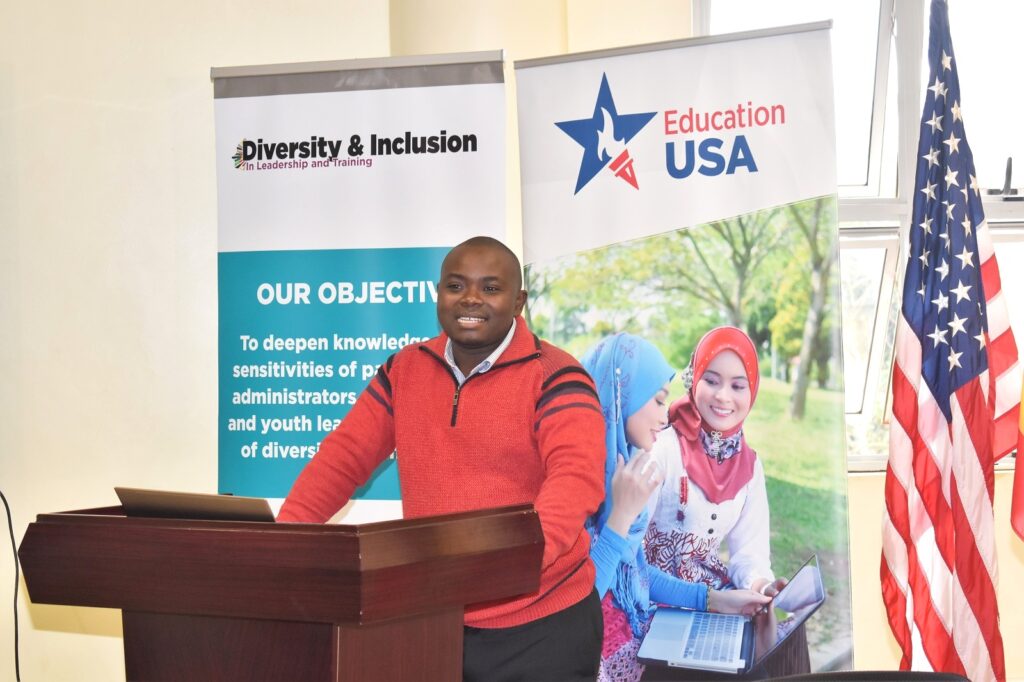
Integration of D&I in teaching, training and community engagements
Speaking to participants on the need to integrate diversity and inclusion in teaching, training and community engagement, the Founder, Africa Diversity and Inclusion Centre (ADIC), Mr Mubiru Ipolito pointed to unconscious bias as one of the major obstacles to nurturing inclusive environments. “We all have unconscious bias in our practices. If we are to create inclusive environments, we must learn to address our biases. Unconscious bias leads to prejudice,” he noted.
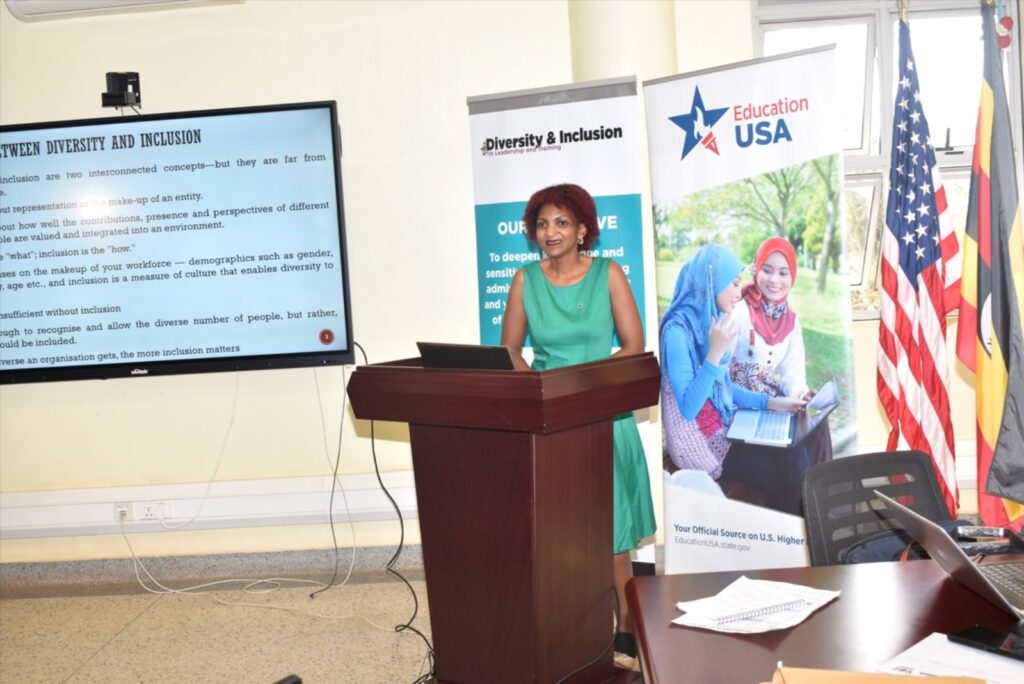
In her presentation titled “Exploration of Inclusive Teaching and Research”, Dr. Euzobia Baine Mugisha, Director Gender Mainstreaming at Makerere University noted that research in higher education institutions was predominantly STEM and a few areas in social sciences. “The link between disciplines & how they affect development is not adequately explored,” she explained, noting that most of the funding goes to science research, a factor that largely undermines inclusivity and development of some units. She further explained that research at the University was still gender-blind despite the initiatives to incorporate gender analysis/perspectives.
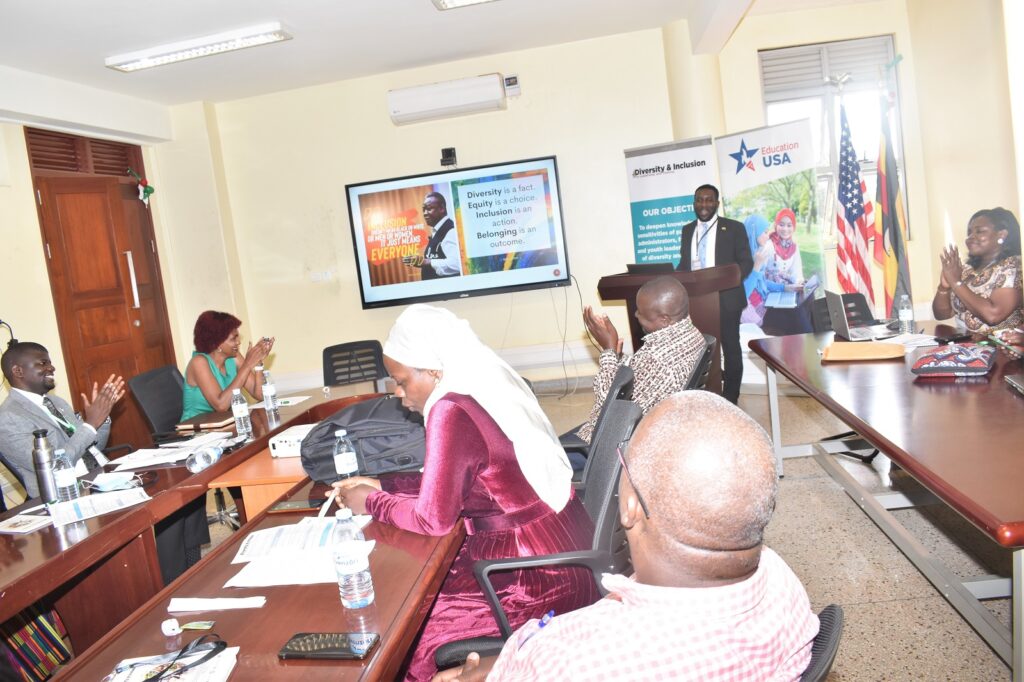
Commenting on the small number of women in leadership positions at Makerere, Dr. Euzobia called for periodical monitoring and evaluation of the University policies from an inclusive perspective. “We should exercise discretion in the implementation of policies. We also need to interrogate the concept of merit and how it applies in real life.” Dr. Euzobia further appealed to the University managers to pick interest in the welfare of staff and students, saying the majority struggle with different challenges that undermine their performance. “We should not rash to judge and exclude them before establishing the root cause of poor performance,” she explained.
Cultivating and nurturing inclusive environments
Regarding the need to cultivate and nurture inclusive environments, Dr. Gorretti Byomire, a Lecturer and Director Makerere University Business School (MUBS) Disability Resource & Learning Centre, called for modification of existing practices and policies to accommodate everyone. “Developing Institutional policies on Diversity Management and training University leadership, staff and students about diversity and inclusion fosters inclusivity at workplaces.
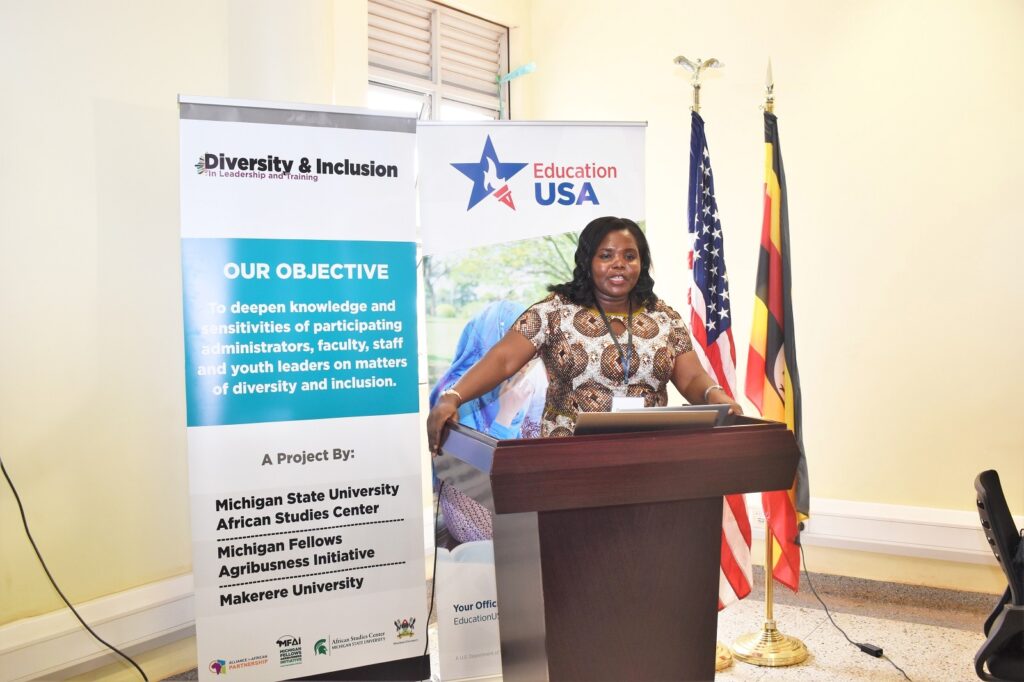
The discussion was moderated by Dr. Losira Sanya, project member, also Lecturer in the Department of Extension and Innovation Studies, CAES, Makerere University.
First D&I training at Makerere: https://caes.mak.ac.ug/uncategorized/makerere-administrators-sensitized-on-significance-of-diversity-and-inclusion/
You may like
-


Call for Applications: Short Course in Molecular Diagnostics March 2026
-
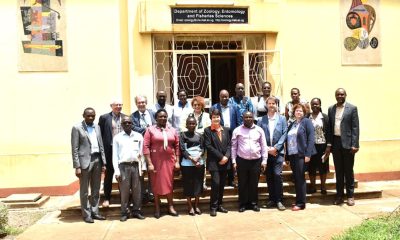

BOKU University Charts New Collaboration Strategies with Mak’s Department of Zoology, Entomology & Fisheries Sciences
-


When Birth Becomes the Most Dangerous Moment, Wanduru & the Work of Making Labour Safer
-
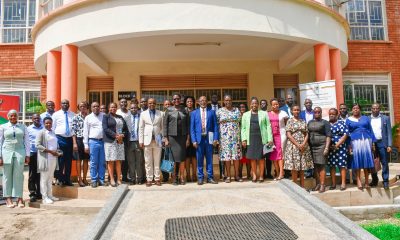

VC Opens Training for MoKCC Officials on Safeguards in Procurement
-


For Youth by Youth – Call for Second Cohort Applications
-


Call for PhD Student Fellowships under H-DATA
Agriculture & Environment
From Adversity to Excellence: The Inspiring Journey of Makerere’s Best Science Student, Esther Ziribaggwa
Published
2 weeks agoon
February 6, 2026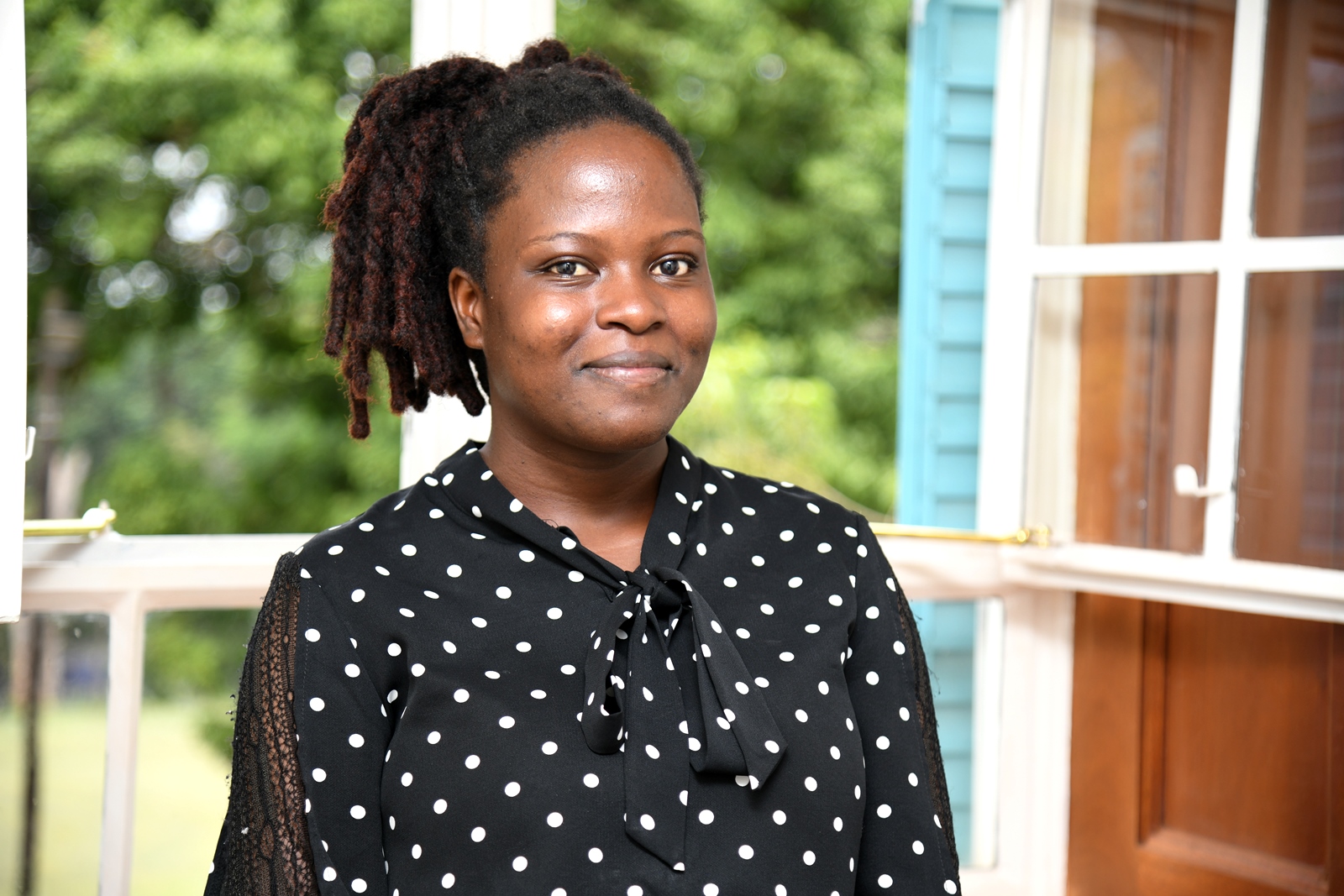
Growing up in Nkonge Village, Kyampisi Sub County in Mukono District, Esther Ziribaggwa learned early the meaning of resilience.
Born to Mr. Musisi Godfrey, a farmer, and Ms. Babirye Resty, a market vendor in Seeta, Mukono District, her journey from humble beginnings to becoming Makerere University’s top-performing student in the Sciences is a testament to her determination, hard work, and unwavering faith. She attained a CGPA of 4.77 in the Bachelor of Agricultural and Rural Innovation, a programme taught at the College of Agricultural and Environmental Sciences (CAES). She will be graduating from Makerere University on 24th February 2026, the first day of the 76th graduation ceremony.
Educational Journey and Navigating the Financial Hurdles to remain in School
Ziribaggwa’s journey to academic excellence has not been smooth. But her parents’ sacrifices laid the foundation for her dreams, even as life presented relentless challenges.
She began her education at Frobel Day and Boarding Primary School and later joined Seeta Boarding Primary School, where she excelled with 9 aggregates in her Primary Leaving Examinations. However, the transition to secondary school presented challenges that tested her resolve.
She joined Mpoma Royal College in Mukono District alongside her sister, who had scored 12 aggregates. Shortly after starting Senior One, their father fell seriously ill, requiring an intestinal surgery, and could not continue to work. With the family unable to pay school fees, both sisters dropped out for a year. It was only through the compassion of the school bursar and the then Head Teacher, Ms. Namazzi Connie, who reduced their fees from 800,000 to 380,000 Uganda Shillings, that Ziribaggwa and her sister were able to return. “The year out of school was a huge setback,” she recalls, “but I focused on catching up. I knew I couldn’t waste this second chance.” Her perseverance paid off. Despite the lost year, she completed her O’ Level with 25 aggregates in eight subjects.
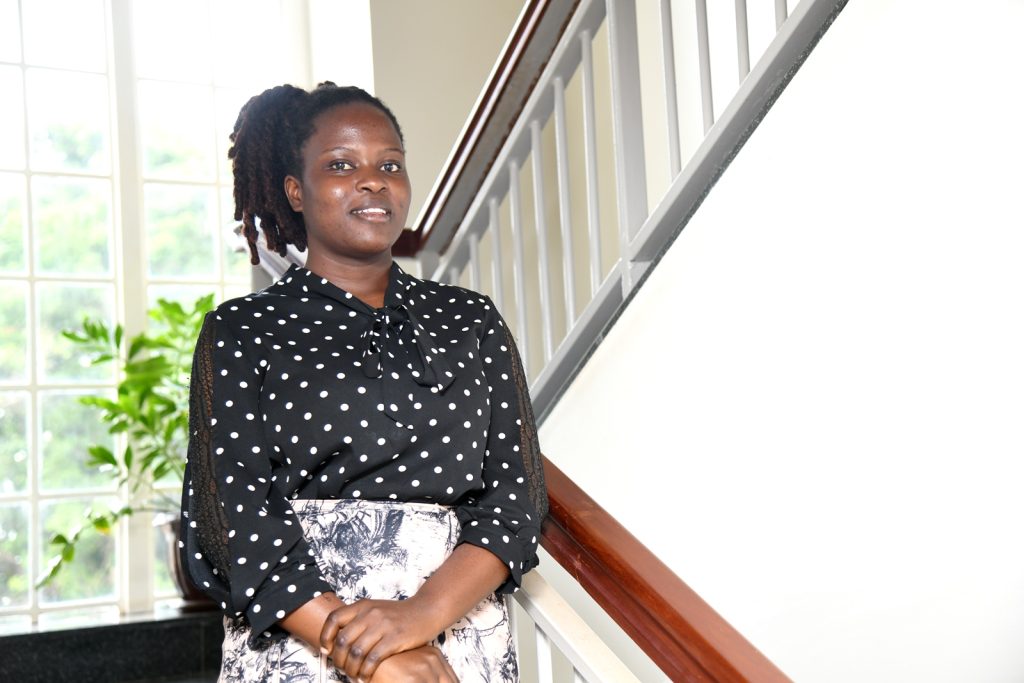
Her A’ Level years were marked by similar challenges. Due to financial constraints, Ziribaggwa attended three different schools. She initially enrolled at Seat of Wisdom Boarding School in Kayunga but was forced to leave when her family could no longer afford the fees. At the time, her father, the family’s sole breadwinner, had undergone a second operation and was unable to work. Her mother, a market vendor, stepped in to support her education and transferred her to Paul Mukasa Day and Boarding Secondary School in Mukono District as a day student. However, the long daily commute was exhausting, leading to a final transfer to Godmark High School in Mukono District where she completed her A’ Level in 2019 with 15 points in Geography, Economics, Agriculture, and Subsidiary Mathematics.
After completing secondary school, Ziribaggwa waited two years before joining university due to financial constraints. Although she had been admitted under the private sponsorship scheme to pursue a Bachelor of Statistics, she was unable to raise the required tuition. Following the outbreak of COVID-19 and the subsequent lockdown, an opportunity arose for her to obtain government sponsorship. At the time, there were no Senior Six leavers, prompting Makerere University to invite applications from candidates who had completed Senior Six within a specified period. The cut-off points across programmes were lowered, enabling her to secure government sponsorship to pursue a Bachelor of Agricultural and Rural Innovation.
Appreciation
She is deeply grateful to the Almighty, her parents, and everyone who supported her educational journey. She is specifically thankful to the Government of Uganda for sponsoring her university education, and to Ms. Namazzi Connie, her O-Level Head Teacher, for subsidizing her school fees. She is also grateful to all her lecturers at CAES and Jesus is King Ministry under the Makerere University Christian Union.
Message of Resilience to Fellow Students
To the students navigating similar challenges, Ziribaggwa shares a message of encouragement. “Never let your situation break you. There’s always going to be challenges, sometimes pushing you to what feels like a point of no return. But those moments should not define your future – they are a test of your resilience. Strive to outgrow them and become a better person, even when the journey feels impossible.”
Career and Aspirations
Ziribaggwa currently works in the extension division of Slow Food Uganda, an agricultural organization based in Mukono District, where her work focuses on women and youth. Although her dream was to become a medical doctor, her love for agriculture has grown over time and does not regret taking on this path. She aspires to become a Senior Agricultural Officer in the country, with the goal of improving farming conditions, particularly in the rural communities. Growing up in a farming community exposed her to many challenges faced by farmers, including unpredictable weather conditions that necessitate irrigation support, and improper use of agrochemical inputs, which pose risks to both soil quality and human health.
Ziribaggwa hopes to pursue further studies in crop and soil science. She draws inspiration from exemplary leaders like Hon. Rebecca Kadaga, former Speaker of the Parliament of Uganda, and First Deputy Prime Minister and Minister for East African Community Affairs. “I have always admired her for being hardworking, resilient, and eloquent,” she says, seeking to emulate these qualities in her own journey.
Agriculture & Environment
Call for Applications: QCF Postdoctoral Research Fellowships
Published
4 weeks agoon
January 20, 2026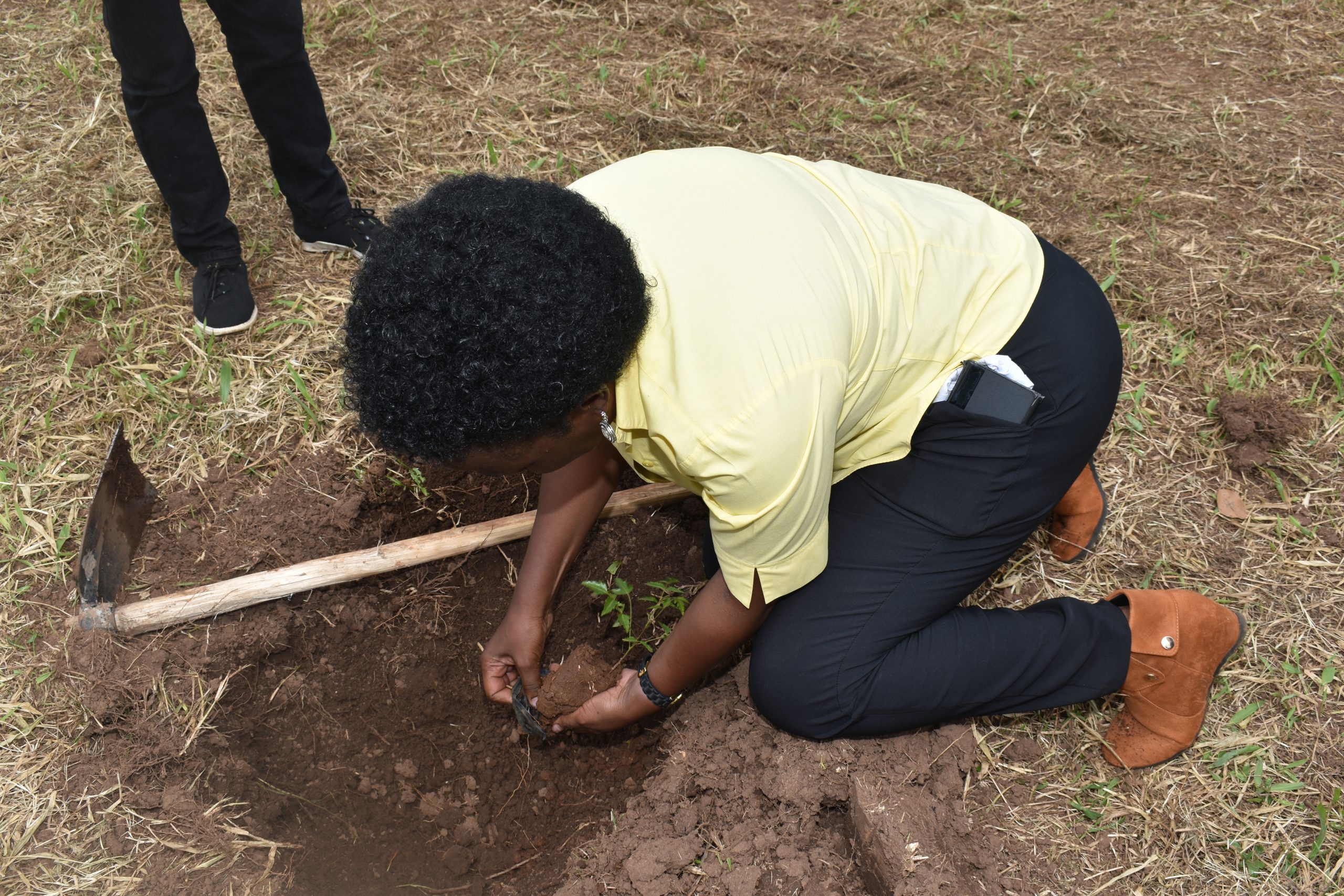
Makerere University’s Department of Geography, Geo-informatics and Climatic Sciences in partnership with Quadrature Climate Foundation and Red Cross Red Crescent Climate Centre are seeking two fellows for Quadrature Climate Foundation (QCF) Fellowship Programme. This is a two-year post-doctoral programme fully funded by QCF, which is an independent charitable foundation working for a greener and fairer future. Applications for the two-year post-doctoral fellowship are invited from individuals with demonstrated interest and expertise in locally led adaptation to climate change research. This initiative is a unique and excellent opportunity to expand the network of interested individuals with researchers and decision-makers, as well as deliver action-oriented research to inform policy and practice. Depending on their interest, each applicant should choose one of the two thematic areas offered under the fellowship program:
- Knowledge co-creation for locally led adaptation to climate change
- Decentralised decision making for effective climate change adaptation and resilience
The Fellow working on the Thematic Area 1: knowledge co-creation for locally adaptation will explore collaborative learning processes (including informal learning) for climate change adaptation among smallholder farmers with focus on Uganda, with linkages to related work in Bangladesh, Mozambique and Nepal. The overall intention is to generate understanding of how decision making processes, across scales, can be linked to local and context specific knowledge systems and process for epistemic just adaptation. The key research questions are:
- What does the process of co-creating knowledge for locally led climate change adaptation look like in a rural smallholder farming setting of a Least Developed Country (LDC)?
- What are the possibilities, promises and pitfalls of knowledge co-creation for locally led adaptation planning?
The research will intentionally contribute to methodological and practice advances in co-creation of knowledge for locally led climate change adaptation.
The research on Thematic Area 2: decentralised decision making for effective adaptation and resilience will undertake scientific interrogation of a climate finance mechanism that has been designed for locally led adaptation and resilience in Uganda. The Fellow will largely focus on testing selected assumptions behind the design of the mechanism. The key questions are:
- How does effective locally led climate change adaptation and resilience building investment decision making look like in practice?
- What works and how does it work? What does not work and why?
Key considerations in the research will include local leadership, inclusion, context specificity, cross-scale, and capability strengthening. The targeted contributions of the fellowship include improved knowledge management for climate resilience planning and decision-making, strengthened evidence-based research-policy-practice dialogues, framework(s) for integrating local and experiential knowledges in resilience building investment decision making processes, among others.
The Fellows will be based, full-time, at Makerere University, Kampala as a core member of the team working on locally led adaptation and resilience. Their work will be conducted under the auspices of the Least Developed Countries Universities Consortium on Climate Change (LUCCC) through which Makerere University is engaged in research and knowledge management collaborations. The Fellowships will focus on Uganda, but with deliberate linkages across LDCs, which might necessitate travels for in-person working meetings.
Roles and responsibilities of the Postdoctoral Research Fellow
The Fellow will be highly motivated to work with a transdisciplinary research team, grow their research expertise, engage with climate change researchers, decision-makers, practitioners and generate different categories of publications. Makerere University will appoint a locally based mentor to the Fellow to provide professional development support. Where needed, the Fellow will participate in teaching and community outreach activities including knowledge sharing in ways that foster collaborative research for adaptation policy and practice.
Requirements:
- A PhD, awarded within the previous three years, in a related discipline (e.g., geography, climate and society, sustainability, adaptation governance, epistemic justice, climate finance).
- Knowledge and experience of locally led adaptation in the agriculture sector.
- Experience in synthesizing and managing datasets and literature.
- Experience in, and knowledgeable of, participatory and collaborative action-oriented research methodologies and tools.
- Demonstrated ability to produce research information products for different audiences.
- Excellent written and verbal communication skills in English
- Demonstrated interest and experience in transdisciplinary collaborations across-scales including with local communities, decision-makers and practitioners in LDCs
- Experience in giving international oral presentations and interest in public communication for wide-ranging categories of audiences
- Data and information visualisation skills will be an added advantage
Application requirements:
Applicants should submit a single PDF with: (i) an application letter not longer than 2 pages that includes indication of theme of interest, a description of research interests, research expertise, and an explanation of how they can work as part of the transdisciplinary research team in line with the fellowship objectives described above; (ii) a CV including a publication list; (iii) copies of academic transcripts and/or certificates; (iv) an example of written work; (v) email addresses of two references who have been directly involved in their PhD research.
Applicants must submit the PDF application document to colocal.caes@mak.ac.ug. Please type “LUCCC PDR Application: COLOCAL-Makerere” as the subject line of the email.
Closing date
Midnight (GMT+3) on 27th February, 2026 or until the position is filled.
Selection process
Eligible and complete applications will be considered followed by communication with short-listed applicants. Makerere University, in consultation with Quadrature Climate Foundation and the Red Cross Red Crescent Climate Centre, will conduct interviews of the short-listed applicants.
If you have not heard from Makerere University within two months of the deadline, please assume your application has been unsuccessful.
Contact details for enquiries about this post-doc fellowship: colocal.caes@mak.ac.ug
Makerere University reserves the right to
- Disqualify ineligible, incomplete and/or inappropriate applications;
- Change the conditions of the award or to make no awards at all
-The QCF Fellowship Programme is a two-year, post-doctoral programme fully funded by Quadrature Climate Foundation (QCF).
-Quadrature Climate Foundation is an independent charitable foundation working for a greener and fairer future. For more information on QCF, please visit qc.foundation.
Agriculture & Environment
Mak-CAES Trains Small-Scale Processors on Soybean Value Addition & Product Development
Published
2 months agoon
December 16, 2025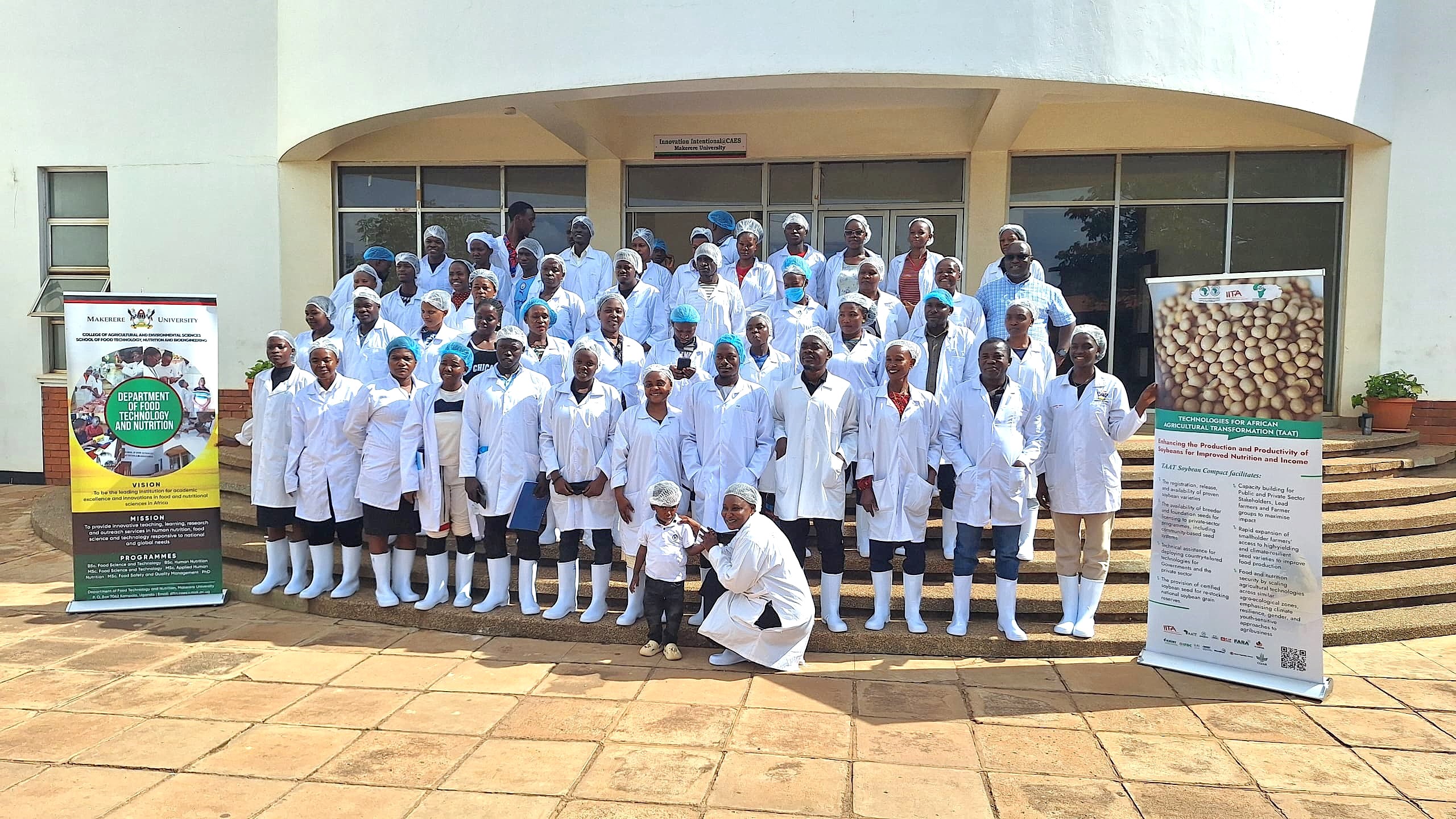
The Department of Food Technology and Nutrition (DFTN), Makerere University, in collaboration with Smart Foods Uganda Ltd, successfully conducted a five-day intensive training on soybean value addition and product development from 24th to 28th November 2025. The training was implemented with support from IITA Uganda under the Training for African Agricultural Transformation (TAAT) Soy Compact Project, aimed at strengthening agro-processing capacities and promoting soybean utilization for improved nutrition and livelihoods.
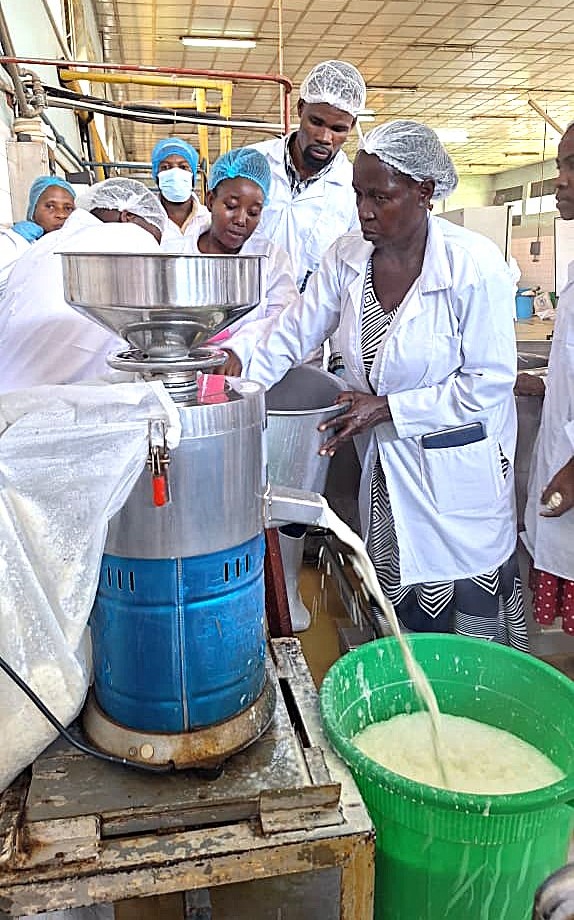
The training program was highly practical and skills-oriented, featuring extensive hands-on sessions designed to equip participants with applicable processing and product development competencies. Most of the practical activities were hosted at Makerere University’s Food Technology and Business Incubation Centre (FTBIC). Participants also benefited from an industry exposure and experiential learning session at Smart Foods Uganda Ltd in Bweyogerere, where they gained first-hand insights into commercial-scale soybean processing operations, quality control systems, and product marketing strategies.

Key thematic areas and technologies covered during the training included soybean nutrition and associated health benefits; assessment of quality attributes of soybeans and soy-based products; application of Good Hygiene Practices (GHP) and Good Manufacturing Practices (GMP); and processing of high-quality soy products. Practical sessions focused on the production of soymilk, tofu, soy yoghurt, soy flour, and soy coffee, as well as the formulation of soy-fortified composite porridge flours. Participants were also trained in the development of various soy-based bakery products, including bread, mandazi, daddies, and baghia. In addition, sessions on marketing, branding and positioning of soy products, as well as UNBS certification requirements and documentation, were conducted to enhance market readiness and regulatory compliance.
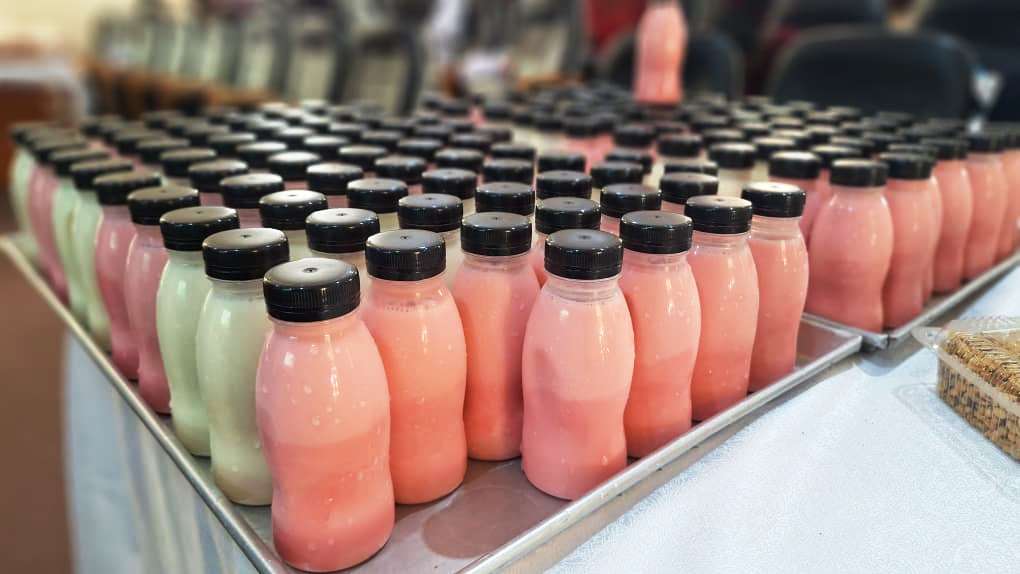
The training attracted a total of 57 participants, comprising small-scale soybean processors and graduating university students, thereby fostering knowledge exchange between academia and industry. Overall, the training contributed significantly to building technical capacity in soybean value addition, promoting entrepreneurship, and supporting the development of nutritious, market-oriented soy-based products in Uganda. The School of Food Technology, Nutrition, and Bioengineering, under the leadership of Dr. Julia Kigozi (Dean), conducts periodical trainings for agro-processors across the country to enhance technical capacity, improve product quality, and promote the adoption of modern, safe, and sustainable food processing practices. These trainings are designed to equip agro-processors with practical skills in food safety, quality assurance, value addition, post-harvest handling, nutrition, and bioengineering innovations, thereby enabling them to meet national and international standards. Through this outreach, the School contributes to strengthening agro-industrial development, reducing post-harvest losses, supporting entrepreneurship, and improving food and nutrition security while fostering stronger linkages between academia, industry, and communities.
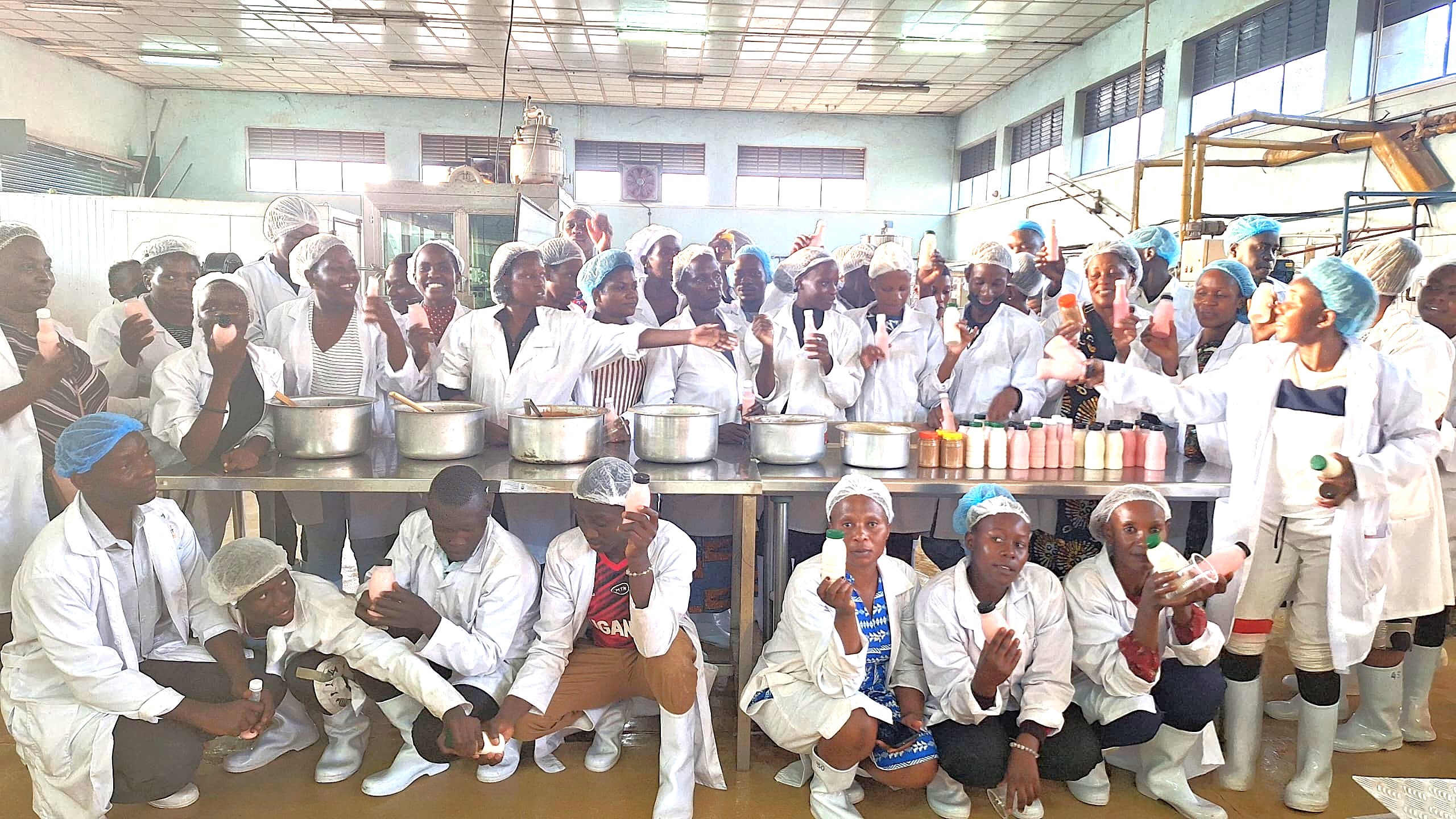
Trending
-

 Agriculture & Environment2 weeks ago
Agriculture & Environment2 weeks agoFrom Adversity to Excellence: The Inspiring Journey of Makerere’s Best Science Student, Esther Ziribaggwa
-

 General1 week ago
General1 week agoAptitude Exam (Paper 1) Results for the Mature Age Entry Scheme 2026/2027
-

 Health2 weeks ago
Health2 weeks agoDr. Samalie Namukose and the Quiet Work of Making Nutrition Count
-

 Research2 weeks ago
Research2 weeks agoCall for PhD Student Fellowships under H-DATA
-
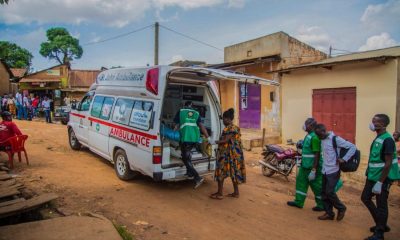
 Health2 weeks ago
Health2 weeks agoHolding the System Together During COVID-19: Steven Kabwama’s Research on Care Continuity
